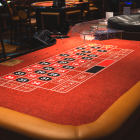Learn more about the lesser-known inside bets of roulette

If there is one game that is synonymous with the casino then perhaps that game is roulette. Immortalised in film and television, this beguilingly simple prediction game has been played in casinos for over 100 years.
The game originated, according to several sources, thanks to a science experiment that didn't quite work. Eminent French scientist and mathematician Blaise Pascal was attempting to build a perpetual motion device when he hit upon the idea of a friction-less wheel.
Of course, Pascal's design didn't work, but what he did develop was a wheel that could be spun easily. It didn't take people long to realise that from this simple invention; a game of chance could be devised.
Soon numbers and colours were used to divide the sectors up on the reel and the game of roulette was born.
What is Roulette?
At its most basic level, roulette is a prediction game of chance, where you can predict what the outcome of a spin on the roulette wheel will be. In typical games, the roulette wheel is spun in one direction and the ball (which is the method used to decide what segment of the wheel is selected) is spun in the opposite direction
So if the wheel is spun in a clockwise direction, the ball would be set in motion in a counter-clockwise motion and vice versa.
Players can predict where the ball will fall by placing a bet using chips. Each player at the table usually has a different coloured chip to play with and bets are placed by placing a chip on the layout.
The layout is the grid on the baize which outlines all the different bets that can be made. What decides the type of bet selected is where the player places the bets. We will examine this in more detail in the How to play Roulette section below.
Once all players bets have been placed, the croupier will then announce that betting is closed and the roulette wheel will be spun and the ball set in motion. Once the ball lands in a segment, the croupier will collect all the losing chips and payout the chips that were placed on winning bets.
When this is completed a new round of betting will begin.
How to play Roulette
The key to understanding roulette is to understand that the wheel and ball are simply the random number generator of the game. As a player, your main concern is not these items but how you can bet more effectively on the layout.
To understand how to bet more effectively, you need to understand how the layout works. On the layout there are many different types of bets but often they are split into two groups, outside bets and inside bets. We'll look at the most common types of bets found in most roulette games, below.
Outside bets - These bets are those that are situated mainly on the outside edge of the layout and it includes all even money and 2/1 bets. Namely:
- 1 to 18 (Manque) - A bet on the numbers between 1 and 18 coming up - Even money
- 19 to 36 (Passe) - A bet on any of the numbers between 19 and 36 coming up - Even money
- Red or Black - A bet on whether the colour of the slot the ball lands in will be red or black - Even money
- Odd or Even - A bet on whether the numbered slot the ball lands in will be odd or even numbered - Even money
- Dozen Bets - Often identified by the numbers 1-12, 13-24 and 25-36 on the layout. These are bets that the ball will land in any of the numbers covered between the two ranges - 2/1
- Column Bet - A bet on all the numbers in one of the three columns of numbers shown in the layout. This bet is placed in the space at the foot of the column after the final number in the column selected. - 2/1
Inside bets - These are bets that are generally greater than the odds shown above and these tend to be placed on the inside of the layout. The type of bet you select corresponds to where you place your chip on the layout as detailed below.
- Single or Straight bet - A bet on any single number. The chip being placed entirely within the square, not touching any of the lines surrounding it. 35/1 (usually)
- Split - A bet placed on any two numbers next to each other in the layout (such as 1 and 4). The numbers can be next to each other horizontally or vertically and the bet is placed on the dividing line between the two numbers. 17/1
- Street - A bet placed on any three numbers in a single horizontal line. You place this bet by placing your chip on the outer line of the number at either end of the line. 11/1
- Square (also known as a Corner) - This is a bet placed on the corner of four adjoining squares making a block, or corner bet. 8/1
- Double Street or Six Line - This is a bet placed on two streets, placed on the corresponding line between two sets of street bets. 5/1
There are a number of other bets, such as Trio, Basket and Top Line bets, which are dependent on whether the roulette you are playing is European Roulette or American Roulette
What is the difference between American and European Roulette?
There's only one difference between the two types of roulette and that is on the American wheel, there is an additional 'Double zero' (00) green sector. This does affect the house edge considerably however, turning it from 2.7% on a single zero wheel (European) to around 5.2% on the American version.
Generally speaking, if you want to keep the house edge down, you should try to play on a European roulette game, rather than the American alternative.
What are my chances when playing Roulette?
In truth, if you play roulette consistently over a long period of time, then the likelihood is that the house will likely earn more from you than you will from it. However, that does not mean that playing cannot be profitable in the short term and fortunately, most players do tend to play for this amount of time.
What is important to realise is that while the house edge remains the same on every bet (in the European version of the game at least), the odds of being successful on your bet does vary greatly depending on what you choose to bet on.
The simple thing to remember is that the more Outside bets you place, the more likely you are to have a successful outcome, though the smaller the likely return will be (odds are just even money or 2/1).
If you place more Inside bets, then you will not win as often, but depending on the bet placed, when you do win, you will win more money on that bet. For example, if you land one Split bet, you will win 17 times your stake back.
So how does that pan out in reality? Well lets say that we played 10 spins of roulette and for 10 spins we placed a 10 chip on 1-18 and a 10 Chip on a Split bet on numbers 1 and 2.
Now let's say the ten spins of the reel produced the following results.
10, 26, 27, 0, 31, 9, 7, 2, 17, 33, 19
With our 10 chip bet on 1-18 on each of the ten spins above, we can see that on six occasions we lost and four we won. This means that we spent 100, but gained back around 80 in winnings; a net loss of 20.
However, with our split bet on 1-2, we can see that we lost nine bets but won one. That single bet paid us out 170 plus our 10 chip back, and we spent 100 in bets, meaning we made a profit of 70.
Don't be fooled into thinking that inside bets therefore offer better long term profitability. If the wheel had landed on any number other than 1 or 2on the seventh spin, we'd have lost 100 over the ten spins and not won anything back at all.
In short, your chances of winning in roulette are better with the more outside bets you place, but you are always fighting against a slight house edge and what is key is to remember to walk away from the tables when you are ahead!
Where can I play mobile roulette?
You try roulette on mobile without deposit. Head on over to the Games page or go direct to the European Roulette Gold page and either claim a sizable first deposit bonus, or if visiting the page on your mobile you can claim a unique registration bonus without deposit. This registration bonus will allow you try the game of roulette on your mobile with $10 real cash on the house.
Byline: This article was written and published by Henry Regal.

.png)

